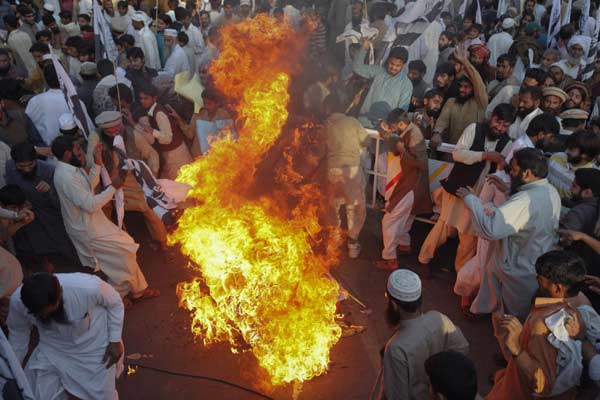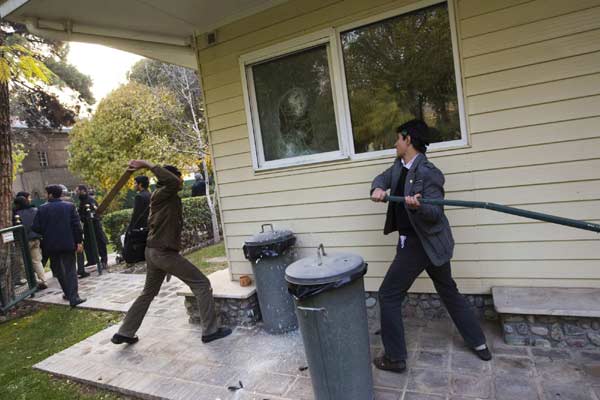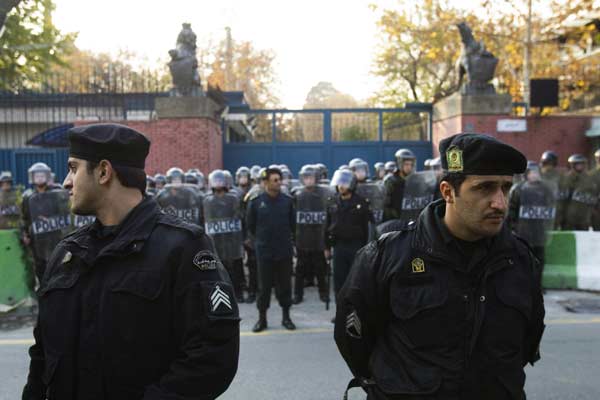Vladimir Putin was not running for office, but parliamentary elections held yesterday in Russia were widely seen as a test of his popularity amid his likely return to the presidency. Election observers and opposition parties pointed to rampant irregularities in the vote, which saw support for his United Russia party plummet. Results in the heavily disputed poll show United Russia still in control, albeit with a much slimmer mandate. Gathered here are images of protests, rallies, and the vote as Russians took to the ballot all over the country with charges of fraud and malfeasance clouding the vote. --





























Elizaveta Semenova is helped by her daughter to fill in a ballot at her home in the village of Oster, Russia on December 4, 2011. Russians cast their ballots with muted enthusiasm in national parliamentary elections, a vote that polls indicate could water down the strength of the party led by Prime Minister Vladimir Putin, despite the government's relentless alization of opposition groups. (Sergei Grits/AP)

A police officer and electoral commission staff empty a ballot box after voting closed at a polling station in the village of Ust-Mana, Russia on December 4, 2011. (Ilya Naymushin/Reuters)

A woman reads a ballot during the parliamentary election in the western Russian village of Klukino on December 4, 2011. (Vasily Fedosenko/Reuters)

A Russian police officer detains an opposition activist during a protest against vote rigging in St. Petersburg on December 4, 2011. (Dmitry Lovetsky/AP)

Protesters demonstrate after voting closed in Russia's parliamentary election in central Moscow on December 4, 2011. The banner reads "We were cheated". (Sergei Karpukhin/Reuters)

People who were unable to reach the nearest polling station cast their ballots in a box brought by an election official in the village of Arzinka, Russia on December 4, 2011. (Pavel Golovkin/AP)

Activists of the Nashi movement, a Kremlin-backed youth organization, wave their banners and applaud during a concert in Moscow on December 4, 2011. (Sergey Ponomarev/AP)

Journalists and observers work beneath a screen showing the first results from voting in Russia's parliamentary election at the Central Electoral Commission in Moscow on December 4, 2011. (Sergei Karpukhin/Reuters)

Activists of the pro-Kremlin youth group "Nashi" gather to celebrate the victory of the United Russia political party in the parliamentary elections in central Moscow on December 5, 2011. (Anton Golubev/Reuters)

Activists of the pro-Kremlin youth groups "Moldaya Gvardiya" and "Nashi" attend a rally as they celebrate the victory of United Russia party in the parliamentary elections in central Moscow on December 5, 2011. (Natalia Kolesnikova/AFP/Getty Images)

Russia's Prime Minister Vladimir Putin prepares his ballot to vote for parliamentary elections at a polling station in Moscow on December 4, 2011. (Alexei Nikolsky/AFP/Getty Images)

Russian police officers block Red Square, with St. Basil's Cathedral in the background, to prevent pro-democracy protesters from entering in Moscow on December 4, 2011. (Ivan Sekretarev/AP)

People queue to vote in parliamentary elections at the Russian consulate in Tskhinvali, South Ossetia on December 4, 2011. (Eduard Korniyenko/Reuters)

A member of the "Polar Bear" sports club casts her ballot at a polling station during the parliamentary election in Barnaul, the capital of Altai region on December 4, 2011. (Andrei Kasprishin/Reuters)

Russian navy sailors queue to cast their ballots at a polling station at the Russian Fleet base in Sevastopol, Ukraine on December 4, 2011. (Andrew Lubimov/AP)

An election commission official uses a pocket light to help a voter to fill out their ballot at his home in the village of Oster, Russia on December 4, 2011. (Sergei Grits/AP)

Russian soldiers have a rest after casting ballots at a polling station in the town of Torzhok, Russia on December 4, 2011. (Andrei Gordeyev/AP)

Police detain an activist during a protest rally by opposition group "Another Russia" in central Moscow on December 4, 2011. (Mikhail Voskresensky/Reuters)

Electoral officials prepare ballots at a polling station in the western Russian city of Pochinok on December 2, 2011. (Vasily Fedosenko/Reuters)

A transport police officer checks a polling station put up to enable passengers using trains to vote at the central railway station in Russia's Siberian city of Krasnoyarsk on December 3, 2011. (Ilya Naymushin/Reuters)

A man leaves a voting booth in the settlement of Voronovo, Russia on December 4, 2011. (Denis Sinyakov/Reuters)

A serviceman holds his child casting a ballot at a polling station in Russia's military base number 201 in Dushanbe on December 4, 2011. (Nozim Kalandarov/Reuters)

A Russian citizen holds his child as he votes inside a local drama theater in Bishkek, Kyrgyzstan on December 4, 2011. (Vyacheslav OseledkoAFP/Getty Images)

Russian soldiers stand in line at a polling station in Moscow on December 4, 2011. (Alexander Zemlianichenko Jr./AP)

The head of Russia's leading independent election watchdog Golos (The Vote), Liliya Shibanova, speaks to journalists in Moscow on December 4, 2011. Golos, which claimed rampant violations in the campaign, said its "Map of Violations" website documenting reports of campaign fraud was the target of a distributed denial of service attack. (Alexey Sazonov/AFP/Getty Images)

The "Russian Soul" amateur folk ensemble performs at a polling station during the parliamentary election in the village of Verkhniaya Biryusa in the Taiga area, south of the Siberian city of Krasnoyarsk on December 4, 2011. (Ilya Naymushin/Reuters)

Electoral officials visit villagers in the western Russian village of Gryaz on December 4, 2011. (Vasily Fedosenko/Reuters)

People vote in their home in the village of Oster, 237 miles west of Moscow on December 4, 2011. (Sergei Grits/AP)








































